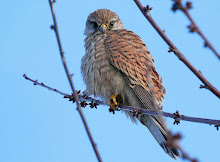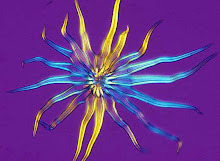Hedgerows are full of young goosegrass Galium aparine plants at the moment, whose rapid growth has been encouraged by mild winter temperatures.
This is one of our most successful and ubiquitous weeds, beautifully adapted to fast growth, prolific seed production and efficient seed dispersal.
The seeds, which are covered in tiny hooks and are dispersed in the fur and feathers of animals, germinate in late autumn and early winter so that by spring the young plants have a head start on surrounding vegetation and begin to flower quickly.
The stems elongate very quickly too and the plant is finely adapted to using surrounding plants for support, thanks to ....

... a covering of tiny, backward-facing hooks on the stems and leaves, seen here under the microscope. In fertile agricultural soils the plant can thread its way through a hedge by early summer, sometimes reaching a length of six feet or more and smothering the hedge by the end of summer, all the while producing thousands of hooked seeds from tiny white flowers that are visited by small insects but probably self-pollinate too.
One reason why goosegrass is such a prolific seed producer is that its habit of scrambling over other plants, using those hooks, means that it doesn't need to invest much energy to producing a strong stem. It takes a hawthorn several years to reach a height of six feet, building stem strength through woody tissue production, but goosegrass can reach the same height in about three months.

This image shows a one cell-thick section through a stem and those yellow stained cells, in a ring in the centre, are the only ones that have any woody strengthening in their cell walls - all the blue-stained cells are pure cellulose.
The narrow line of yellow staining on the outside of the stem is the waxy cuticle, that protects the plant from water loss.
























I curse the stuff but I now see it rather differently.
ReplyDeleteYou can certainly have too much of it!
DeleteBeen a watcher for a while, but forced into commenting after reading this post. I love your blog, short, to the point and always stimulating. Please don't ever stop!!! :D All th every best to you, Seth.
ReplyDeleteThanks Seth, I really appreciate that kind comment. All the best to you for 2016!
DeleteLike a cervical x-ray of goosegrass! She's elegant.
ReplyDeleteGotta love weeds! Functional beauty.
DeleteIt is pretty close up, and your first photo is lovely. But I can't help but hate the stuff as it swamps my little woodland area in spring then dies off, looking very ugly. Right now it's swamping my veg patch so I'm trying to rip out handfuls to give to the chickens!
ReplyDelete